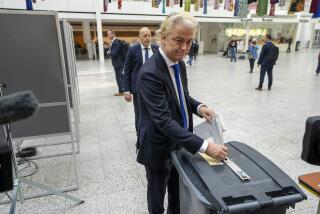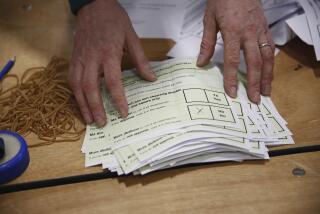EC TREATY : Now It’s Ireland’s Turn to Vote on United Europe : A recent poll shows 2-to-1 majority for the pact. Danes favored it by a greater margin before they turned on it.
- Share via
BRUSSELS — Irish voters will have a chance Thursday to add their voices to Western Europe’s mounting chorus of rebellion against an economically and politically united continent--and against the politicians who are driving Europe that way.
Ireland’s most recent poll shows that a 2-to-1 majority favors ratifying the European union treaty that was negotiated by the heads of the 12 European Community nations last December. But that is nothing like the 5-to-1 margin that prevailed before Danes shocked Europe’s political Establishment on June 2 by refusing to ratify the treaty.
And the rebellion is showing signs of spreading to the two pillars of the European Community, France and Germany.
Analysts here trace the revolt not so much to the treaty itself, an abstruse, 250-page document that would give Europe a single currency by 1999 and move the region toward common policies on everything from national security to factory working conditions.
Instead, they point to a growing gulf between Europe’s people and its politicians--particularly those at the EC headquarters in Brussels but also those at the national level who are proposing to cede more responsibility to Brussels.
It is the European version of what, in the United States, has sparked the insurgent presidential candidacy of businessman Ross Perot.
“The politicians are getting away from the people,” said Jochen Hansen, research director of Germany’s Allensbach Institute. “What we’re seeing is a protest against the elected leaders.”
Only in Britain was there any serious public debate before EC leaders signed the European union treaty last December.
As the conservative French daily Le Figaro said after the Danish vote, “A small people has dealt the bigwigs of this world a lesson in humility.”
One bigwig who has taken notice is Brussels’ top bureaucrat, Jacques Delors, president of the EC’s policy-formulating Commission. Delors called this week for a more open, less complicated European Community.
Delors himself could fall victim to the anti-union sentiment. His second four-year term as head of the EC ends at the end of this year, and his chances of being chosen again by the heads of the 12 EC nations have apparently dimmed in the wake of the Danish referendum.
It is the voters of Ireland, however, who will have the next say. Although all four major political parties are campaigning hard for the treaty, its margin of support after the Danish vote was only 47% to 23%, according to an Irish Times poll. Just one month before, the score had been 57% to 11%.
As the government never tires of saying, the treaty is in Ireland’s economic interest. Ireland already receives the equivalent of 7% of its annual economic output from the EC in various aid programs, and the unity treaty promises still more.
Opposition comes from a combination of forces, including extremists from both ends of Ireland’s emotional abortion debate. Pro-choice groups complain that the treaty would leave Ireland free to ban abortion; antiabortion groups worry that it would lock the country into its current constitutional ban, which the Supreme Court recently held to allow abortion if the mother threatened suicide.
On top of that, anti-Europeanists argue that the pact would compromise Irish neutrality. The Greens and far-left parties also oppose it.
John Cooney, a Dublin journalist who was a spokesman for the EC’s agriculture commissioner in 1990 and 1991, said the Irish, like Europeans everywhere, simply do not trust the treaty. “The protest is against the Irish government for not explaining what it was signing,” Cooney said. “The people are quite angry.”
More to Read
Sign up for Essential California
The most important California stories and recommendations in your inbox every morning.
You may occasionally receive promotional content from the Los Angeles Times.









